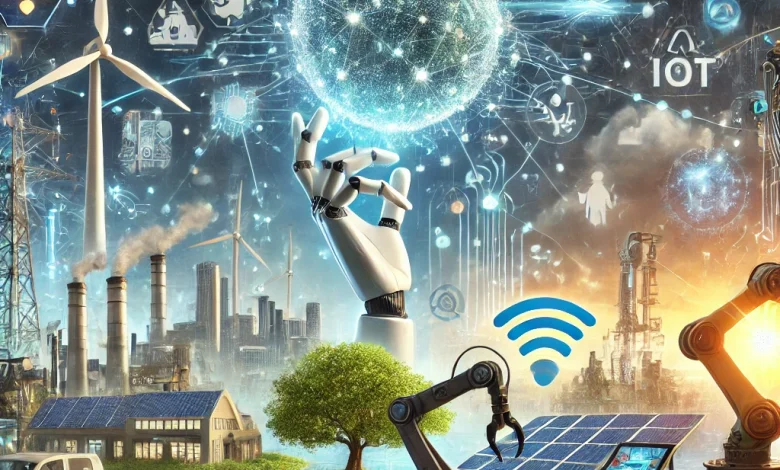7 Powerful Ways Intelligente Systeme are Revolutionizing Technology and Driving a Sustainable Future

Table of Contents
Introduction
Definition of Intelligente Systeme: Intelligente Systeme, or intelligent systems, are advanced technological solutions that combine artificial intelligence (AI), machine learning (ML), sensors, and data-driven algorithms to perform tasks autonomously or assist humans in decision-making. These systems simulate cognitive functions such as learning, reasoning, and problem-solving, making them pivotal in the modern digital era.
Importance of intelligent systems in modern technology: In today’s fast-evolving technological landscape, Intelligente Systeme play a crucial role in driving innovation and efficiency. They have become indispensable in various sectors, enabling automation, enhancing precision, and transforming traditional processes. As technology becomes increasingly embedded in our daily lives, the relevance of intelligent systems continues to grow exponentially.
Brief overview of their applications and potential impact: From healthcare to transportation, Intelligente Systeme have revolutionized industries by improving efficiency, safety, and productivity. Their applications range from autonomous vehicles and smart home devices to robotic surgery and environmental monitoring. These systems not only optimize resource utilization but also pave the way for groundbreaking advancements that could redefine how we interact with technology.
Components of Intelligente Systeme
Core Technologies: Artificial Intelligence (AI), Machine Learning (ML), and Deep Learning
AI, ML, and deep learning are the foundational pillars of Intelligente Systeme. While AI encompasses the broad concept of machines mimicking human intelligence, ML focuses on algorithms that allow systems to learn from data. Deep learning, a subset of ML, utilizes neural networks to analyze complex patterns and make sophisticated decisions. Together, these technologies empower intelligent systems to evolve and adapt over time.
Sensors and IoT Integration
Sensors and Internet of Things (IoT) devices are vital for data acquisition in Intelligente Systeme. By collecting real-time data from the environment, these components enable intelligent systems to monitor conditions, detect anomalies, and respond appropriately. IoT integration further enhances connectivity, creating a seamless network of interconnected devices that communicate efficiently.
Data Collection and Processing
Data is the lifeblood of Intelligente Systeme. These systems rely on vast amounts of data to function effectively. Advanced data processing techniques, including big data analytics, enable the extraction of meaningful insights from raw information. This ensures accurate predictions, timely responses, and improved decision-making capabilities.
Decision-Making Algorithms
Decision-making algorithms are the brain of Intelligente Systeme. These algorithms use collected data to evaluate scenarios, predict outcomes, and make optimal decisions. Techniques such as reinforcement learning and predictive analytics are often employed to refine the decision-making process, ensuring reliability and accuracy in complex situations.
Types of Intelligente Systeme
Autonomous Systems
Autonomous systems operate independently, requiring minimal human intervention. Examples include self-driving cars and drones. These systems utilize AI, sensors, and real-time data processing to navigate environments, avoid obstacles, and complete tasks efficiently. Autonomous vehicles, for instance, are revolutionizing transportation by enhancing safety and reducing traffic congestion.
Smart Devices
Smart devices are an integral part of Intelligente Systeme, designed to simplify everyday tasks. Examples include smart home assistants like Amazon Alexa and wearable devices such as fitness trackers. These devices integrate AI and IoT to provide personalized experiences, automate routines, and deliver real-time insights to users.
Robotic Systems
Robotic systems, both industrial and service-oriented, are significant applications of Intelligente Systeme. Industrial robots streamline manufacturing processes by performing repetitive tasks with precision. Service robots, on the other hand, assist in areas like healthcare, hospitality, and customer service, enhancing efficiency and customer satisfaction.
Decision Support Systems
Decision support systems are designed to aid professionals in making informed decisions. Commonly used in healthcare, finance, and business, these systems analyze data, predict trends, and recommend actions. For instance, in healthcare, they assist in diagnosing diseases and planning treatments based on patient data.
Applications of Intelligente Systeme
Healthcare
In the healthcare sector, Intelligente Systeme are driving transformative changes. Diagnostic tools powered by AI can analyze medical data to identify diseases with high accuracy. Surgical robots enable minimally invasive procedures, reducing recovery times. Additionally, patient monitoring systems provide real-time insights, ensuring timely interventions and improved outcomes.
Transportation
Transportation has witnessed a significant overhaul with the advent of Intelligente Systeme. Autonomous vehicles and traffic management systems optimize routes, enhance safety, and reduce emissions. These systems also enable smart logistics, improving supply chain efficiency and ensuring timely deliveries.
Industry
In industrial settings, Intelligente Systeme enhance operational efficiency through predictive maintenance, process optimization, and automation. Predictive maintenance minimizes downtime by identifying potential equipment failures before they occur. Process optimization ensures maximum productivity, while automation reduces human error and operational costs.
Education
The education sector benefits immensely from Intelligente Systeme. Personalized learning platforms tailor educational content to individual needs, enhancing student engagement and retention. Virtual tutors powered by AI provide real-time assistance, ensuring students grasp complex concepts effectively. These advancements make education more accessible and inclusive.
Environment
Intelligente Systeme play a crucial role in environmental sustainability. Smart energy systems optimize power consumption, reducing waste and promoting renewable energy sources. Pollution monitoring systems provide actionable insights to combat environmental degradation. Additionally, intelligent resource management systems ensure efficient utilization of natural resources.
Benefits of Intelligente Systeme
Increased Efficiency and Productivity
By automating repetitive tasks and optimizing processes, Intelligente Systeme significantly boost efficiency and productivity. These systems enable organizations to achieve more with fewer resources, driving growth and competitiveness.
Enhanced Decision-Making Capabilities
Intelligente Systeme leverage advanced analytics to provide data-driven insights. This enhances decision-making across various sectors, ensuring accuracy and reducing risks. For example, predictive analytics in finance helps identify investment opportunities, while AI-powered diagnostics in healthcare improve patient outcomes.
Improved Safety in Critical Areas
Safety is a critical aspect where Intelligente Systeme excel. In transportation, autonomous vehicles reduce accidents by eliminating human errors. In healthcare, intelligent monitoring systems detect anomalies, preventing adverse events. These systems contribute to creating safer environments in critical domains.
Cost Savings Over Time
While the initial investment in Intelligente Systeme may be high, the long-term cost savings are substantial. Automation reduces labor costs, predictive maintenance minimizes downtime, and process optimization lowers operational expenses. These benefits make intelligent systems a cost-effective solution in the long run.
Challenges and Ethical Considerations
Data Privacy and Security Concerns
The reliance on data in Intelligente Systeme raises significant privacy and security concerns. Unauthorized access, data breaches, and misuse of personal information pose serious risks. Ensuring robust cybersecurity measures and adhering to data protection regulations is crucial to address these challenges.
Bias in AI Algorithms
Bias in AI algorithms is a pressing issue that can lead to unfair outcomes. Intelligente Systeme trained on biased datasets may perpetuate discrimination or inaccuracies. Addressing this challenge requires diverse training data and continuous monitoring to ensure fairness and inclusivity.
Dependency on Technology and Job Displacement
The widespread adoption of Intelligente Systeme has brought about significant benefits, but it also raises concerns about over-dependence on technology and potential job displacement in various sectors. Automation of routine and repetitive tasks has led to increased efficiency and cost savings, but it has also reduced the demand for certain job roles, particularly those involving manual or low-skill labor.
As machines and AI systems take over tasks traditionally performed by humans, industries such as manufacturing, logistics, and customer service have seen a notable shift in their workforce dynamics. For example, automated production lines and robotic systems can operate 24/7 without fatigue, reducing the need for human operators. Similarly, AI-powered chatbots and virtual assistants have replaced many customer support roles, providing faster and more cost-effective solutions.
This shift has sparked concerns about economic inequality and social disruption. Workers in affected sectors may find themselves out of jobs, unable to compete with the speed and precision of intelligent systems. This creates an urgent need for reskilling and upskilling initiatives to prepare the workforce for the evolving job market. Governments, educational institutions, and private organizations must collaborate to offer training programs focused on digital literacy, programming, data analysis, and other skills relevant to the AI-driven economy.
Moreover, the dependency on technology itself poses risks. Over-reliance on Intelligente Systeme can make individuals and organizations vulnerable to system failures, cyberattacks, or technological disruptions. For instance, a malfunction in automated supply chain systems could lead to significant delays and losses. Therefore, it is essential to establish contingency plans and ensure that human oversight remains an integral part of critical operations.
Another consideration is the psychological and societal impact of this dependency. Overuse of technology in the workplace may lead to reduced interpersonal interactions, affecting teamwork and communication. It can also contribute to the deskilling of workers, as they become less involved in decision-making and problem-solving processes.
Despite these challenges, the transition to a technology-driven economy also opens up new opportunities. As routine tasks are automated, humans can focus on more creative, strategic, and emotionally intelligent roles. Emerging fields such as AI ethics, data science, and human-machine collaboration require specialized skills that can create new job opportunities. Organizations can also leverage intelligent systems to enhance employee productivity and job satisfaction by automating mundane tasks and allowing workers to focus on meaningful and innovative projects.
Addressing the challenges of technology dependency and job displacement requires a balanced approach. Policymakers must implement regulations that promote ethical AI usage, protect workers’ rights, and ensure equitable access to opportunities created by intelligent systems. Additionally, fostering a culture of lifelong learning and adaptability will be crucial for individuals to thrive in an AI-driven world. By proactively addressing these concerns, society can harness the potential of Intelligente Systeme while mitigating their adverse effects.
Ethical Implications of Decision-Making
Ethical considerations arise when Intelligente Systeme make decisions that impact human lives. For instance, in autonomous vehicles, determining the course of action during an unavoidable accident involves moral dilemmas. Establishing ethical guidelines and accountability frameworks is essential to address these concerns.
Future of Intelligente Systeme
Trends in AI and Emerging Technologies
The future of Intelligente Systeme is shaped by advancements in AI and emerging technologies. Innovations such as quantum computing, edge AI, and generative AI are expected to enhance the capabilities of intelligent systems, enabling them to tackle more complex challenges.
Innovations in Human-Machine Collaboration
Human-machine collaboration is evolving, with Intelligente Systeme complementing human efforts rather than replacing them. Collaborative robots (cobots) and AI-powered assistants are examples of this synergy, improving efficiency while maintaining the human touch.
The Role of Regulations and Governance
Regulations and governance play a critical role in ensuring the responsible development and deployment of Intelligente Systeme. Policies focusing on data privacy, ethical considerations, and accountability will shape the future trajectory of these systems.
Dependency on Technology and Job Displacement
The widespread adoption of Intelligente Systeme has brought about significant benefits, but it also raises concerns about over-dependence on technology and potential job displacement in various sectors. Automation of routine and repetitive tasks has led to increased efficiency and cost savings, but it has also reduced the demand for certain job roles, particularly those involving manual or low-skill labor.
As machines and AI systems take over tasks traditionally performed by humans, industries such as manufacturing, logistics, and customer service have seen a notable shift in their workforce dynamics. For example, automated production lines and robotic systems can operate 24/7 without fatigue, reducing the need for human operators. Similarly, AI-powered chatbots and virtual assistants have replaced many customer support roles, providing faster and more cost-effective solutions.
This shift has sparked concerns about economic inequality and social disruption. Workers in affected sectors may find themselves out of jobs, unable to compete with the speed and precision of intelligent systems. This creates an urgent need for reskilling and upskilling initiatives to prepare the workforce for the evolving job market. Governments, educational institutions, and private organizations must collaborate to offer training programs focused on digital literacy, programming, data analysis, and other skills relevant to the AI-driven economy.
Moreover, the dependency on technology itself poses risks. Over-reliance on Intelligente Systeme can make individuals and organizations vulnerable to system failures, cyberattacks, or technological disruptions. For instance, a malfunction in automated supply chain systems could lead to significant delays and losses. Therefore, it is essential to establish contingency plans and ensure that human oversight remains an integral part of critical operations.
Another consideration is the psychological and societal impact of this dependency. Overuse of technology in the workplace may lead to reduced interpersonal interactions, affecting teamwork and communication. It can also contribute to the deskilling of workers, as they become less involved in decision-making and problem-solving processes.
Despite these challenges, the transition to a technology-driven economy also opens up new opportunities. As routine tasks are automated, humans can focus on more creative, strategic, and emotionally intelligent roles. Emerging fields such as AI ethics, data science, and human-machine collaboration require specialized skills that can create new job opportunities. Organizations can also leverage intelligent systems to enhance employee productivity and job satisfaction by automating mundane tasks and allowing workers to focus on meaningful and innovative projects.
Addressing the challenges of technology dependency and job displacement requires a balanced approach. Policymakers must implement regulations that promote ethical AI usage, protect workers’ rights, and ensure equitable access to opportunities created by intelligent systems. Additionally, fostering a culture of lifelong learning and adaptability will be crucial for individuals to thrive in an AI-driven world. By proactively addressing these concerns, society can harness the potential of Intelligente Systeme while mitigating their adverse effects.
Vision for a Sustainable Future
Intelligente Systeme hold immense potential for fostering a sustainable future. By optimizing resource utilization, reducing waste, and addressing environmental challenges, these systems can contribute significantly to achieving global sustainability goals. Their transformative impact spans multiple domains, from energy efficiency and urban planning to natural resource management and climate change mitigation.
Optimizing Resource Utilization
One of the key ways Intelligente Systeme promote sustainability is through the efficient use of resources. Smart systems powered by AI and IoT can monitor and optimize energy, water, and raw material usage in real time. For instance, intelligent manufacturing systems can minimize material waste and energy consumption by adjusting production processes based on demand. Similarly, AI-powered irrigation systems in agriculture use sensors to monitor soil conditions, ensuring water is applied only where and when needed, thereby reducing wastage and promoting sustainable farming practices.
Reducing Waste
Waste reduction is another critical area where Intelligente Systeme can make a significant impact. Smart waste management systems equipped with sensors and AI can identify waste patterns, optimize collection routes, and enhance recycling efforts. For example, waste-sorting robots use AI to identify and separate recyclable materials from general waste, improving recycling rates and reducing landfill reliance. Additionally, predictive maintenance systems in industries help identify potential equipment failures before they occur, preventing costly downtime and reducing waste generated from malfunctioning machinery.
Enabling Renewable Energy Solutions
The transition to renewable energy sources is a cornerstone of sustainable development, and Intelligente Systeme play a pivotal role in this transformation. AI-driven energy management systems can forecast energy demand, optimize energy storage, and integrate renewable sources like solar and wind into the grid. By balancing supply and demand, these systems ensure a reliable and efficient energy supply while reducing dependency on fossil fuels. Furthermore, smart grids powered by AI enable decentralized energy systems, where homes and businesses can generate, store, and share renewable energy, fostering a more sustainable and resilient energy network.
Smart Cities and Urban Sustainability
The integration of Intelligente Systeme into urban planning and management is essential for creating sustainable cities. Smart cities leverage intelligent systems to enhance energy efficiency, reduce emissions, and improve quality of life. For instance, AI-powered traffic management systems reduce congestion and fuel consumption by optimizing traffic flow. Smart lighting systems automatically adjust street lighting based on real-time data, saving energy without compromising safety. Moreover, intelligent building management systems monitor and control heating, cooling, and lighting to minimize energy consumption while maintaining occupant comfort.
Conservation Efforts and Biodiversity Protection
Intelligente Systeme also contribute to environmental conservation and biodiversity protection. AI-powered monitoring systems can track wildlife populations, detect illegal activities such as poaching, and assess the health of ecosystems. Remote sensing technologies, combined with machine learning, analyze satellite imagery to identify deforestation, habitat loss, and other environmental changes. These insights enable conservationists and policymakers to take proactive measures to protect endangered species and restore ecosystems.
Climate Change Mitigation and Adaptation
Climate change poses one of the greatest challenges of our time, and Intelligente Systeme are invaluable tools in both mitigation and adaptation efforts. Predictive analytics powered by AI can model the impacts of climate change, providing actionable insights for policymakers and communities. For example, intelligent systems can forecast extreme weather events, enabling timely disaster preparedness and response. In agriculture, AI-powered tools help farmers adapt to changing climatic conditions by recommending crop varieties and planting schedules that are more resilient to climate variations.
Circular Economy and Sustainable Business Practices
The shift toward a circular economy is another area where Intelligente Systeme are driving change. AI-powered platforms facilitate the reuse and recycling of materials by analyzing product life cycles and identifying opportunities for repurposing. In retail and supply chains, intelligent systems optimize inventory management to reduce overproduction and waste. Moreover, businesses can use AI-driven sustainability analytics to measure and improve their environmental footprint, aligning with global sustainability standards and consumer expectations.
Collaboration and Global Impact
The global nature of sustainability challenges necessitates collaboration across borders, industries, and disciplines. Intelligente Systeme enable this by fostering data sharing and collective action. For example, global climate models powered by AI combine data from multiple sources to provide a comprehensive understanding of climate trends and potential solutions. Furthermore, intelligent systems facilitate knowledge exchange between governments, organizations, and communities, accelerating the adoption of best practices and scalable solutions.
Empowering Communities for a Sustainable Future
Beyond their technological capabilities, Intelligente Systeme empower communities to actively participate in sustainability initiatives. Smart apps and platforms provide individuals with actionable insights into their energy consumption, waste generation, and carbon footprint, encouraging sustainable behaviors. For instance, mobile apps can suggest eco-friendly transportation options, monitor household energy usage, and incentivize recycling through gamification.
Challenges and Future Directions
While the potential of Intelligente Systeme for sustainability is immense, their implementation comes with challenges. These include the energy consumption of AI systems themselves, the digital divide that limits access to intelligent technologies, and ethical concerns related to data privacy and algorithmic bias. Addressing these challenges requires continued innovation, responsible governance, and equitable access to technology.
Looking ahead, the evolution of Intelligente Systeme will play a critical role in shaping a sustainable future. Advancements in AI, machine learning, and IoT will further enhance their capabilities, enabling more precise, efficient, and scalable solutions. By aligning technology with sustainability goals, Intelligente Systeme can drive the transition to a more resilient, equitable, and environmentally friendly world.
Conclusion
Intelligente Systeme have emerged as a cornerstone of modern technology, reshaping industries and addressing some of the most pressing global challenges. By leveraging advanced AI, machine learning, and IoT integration, these systems enhance efficiency, productivity, and decision-making across diverse domains such as healthcare, transportation, and environmental sustainability.
While the journey towards widespread adoption comes with challenges like ethical considerations, job displacement, and data privacy concerns, these issues can be mitigated through responsible governance, continuous innovation, and upskilling the workforce. As we look ahead, Intelligente Systeme hold immense promise for fostering a sustainable, equitable, and technologically advanced future. By aligning their development with societal and environmental goals, these systems will continue to redefine how we live, work, and interact with technology.
FAQs
1. What are Intelligente Systeme?
Intelligente Systeme are advanced systems that integrate artificial intelligence (AI), machine learning (ML), sensors, and data-driven algorithms to perform tasks autonomously or assist humans in decision-making.
2. How do Intelligente Systeme differ from traditional systems?
Unlike traditional systems, Intelligente Systeme use AI and ML to learn, adapt, and make decisions based on real-time data, enabling them to handle complex tasks and scenarios with minimal human intervention.
3. What are the key components of Intelligente Systeme?
The core components include:
- Artificial Intelligence (AI) and Machine Learning (ML)
- Sensors and IoT integration
- Data collection and processing systems
- Decision-making algorithms
4. In which industries are Intelligente Systeme commonly used?
They are widely used in industries such as:
- Healthcare: Diagnostic tools, robotic surgeries, and patient monitoring.
- Transportation: Autonomous vehicles and smart traffic management.
- Industry: Predictive maintenance and process optimization.
- Environment: Smart energy systems and pollution monitoring.
5. What are the benefits of using Intelligente Systeme?
Key benefits include increased efficiency, enhanced decision-making, improved safety, and long-term cost savings. They also enable innovation in areas like personalized learning, sustainable energy, and smart city development.
6. What challenges do Intelligente Systeme face?
Challenges include data privacy and security risks, algorithmic bias, job displacement, and over-dependence on technology. Addressing these requires ethical considerations, robust policies, and workforce reskilling initiatives.
7. How do Intelligente Systeme contribute to sustainability?
These systems optimize resource utilization, reduce waste, enable renewable energy solutions, and support urban sustainability through smart city applications and efficient energy management.
8. What role do regulations play in the development of Intelligente Systeme?
Regulations ensure that Intelligente Systeme are developed and deployed responsibly. Policies addressing ethical considerations, data privacy, and accountability play a critical role in their sustainable and equitable adoption.
9. Are Intelligente Systeme replacing human jobs?
While they automate many routine tasks, they also create opportunities in fields like AI ethics, data science, and human-machine collaboration. Workforce reskilling and upskilling are essential to adapt to the evolving job market.
10. What is the future of Intelligente Systeme?
The future of Intelligente Systeme includes advancements in AI, quantum computing, and edge computing. These systems will further enhance human-machine collaboration and contribute to solving global challenges in sustainability, healthcare, and beyond.



